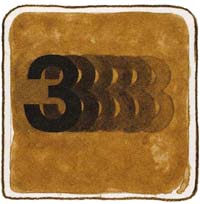|
|
Section 2: Display Control 36 36
|
|
|
|
After automatically switching from fixed point to scientific notation, the
display automatically reverts back to the fixed point display originally selected
when new numbers come into the display. Note that automatic switching occurs only
between fixed and scientific notation displays—engineering notation display
must be selected with the ENG .
|
|
|
|
Any time the HP-41C must display a single line of information which exceeds
the 12-character display, the calculator automatically
‘‘scrolls’’ the line through the display to the left so
that you can see the complete line.
|
|
|

|
|
|
|
Annunciators
|
|
|
|
The HP-41C display contains seven ‘‘annunciators’’ or key
words that tell you the status of the calculator. Each annunciator tells you
something about how the calculator is operating at that moment.
|
|
|
|
|
|
BAT
|
USER
|
GRAD
|
SHIFT
|
01234
|
PRGM
|
ALPHA
|
|
|
|
|
|
|
BAT (Battery) Low Power Annunciator
|
|
If the BAT annunciator is displayed, this
means you have about 10-30 days of operating time left (using alkaline batteries).
The best thing to do when BAT turns on is
to put HP-41C batteries on your shopping list. (Refer to Batteries,
page 240).
Because the HP-41C uses so little power, the normal battery life should be 9-12
months, depending on the freshness of the batteries installed and how much you
use your calculator.
|
|
|
|
USER Mode Annunciator
|
|
When you press the USER key to set the HP-41C to USER
mode, the USER annunciator in the display
turns on. This lets you know that your customized keyboard has become active.
The functions that you have assigned to the keyboard become active and the normal
functions on those keys are no longer active. For an introductory discussion of
USER mode, turn to operating Keys on
page 15. USER mode is covered
in detail in section 4.
|
|
|
|
GRAD-RAD Mode Annunciator
|
|
When you execute the GRAD function, the HP-41C is placed
in GRADs trigonometric mode and the GRAD
annunciator turns on. When you execute the RAD function,
the HP-41C is placed in RADians mode and the
RAD portion of the display annunciator
turns on. Function execution is covered in
section 4
and trigonometric modes are covered in detail in
section 6.
|